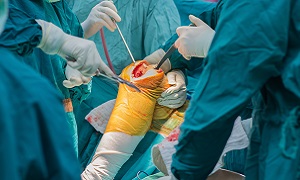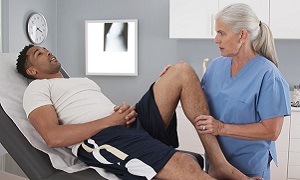Best Doctors in India for Dislocated Knee Treatment
Best Hospitals in India for Dislocated Knee Treatment
- City: Bengaluru, India
Hospital Highlights:
- Fortis Hospital Bannerghatta, Bengaluru was established in 2006.
- The hospital is a 276 bedded multi-specialty tertiary care facility.
- The hospital specializes in cutting-edge medical technology and dedicated patient care services.
- The hospital is equipped with state-of-the-art technologies like trans-radial angioplasty, trans-abdominal cardiac surgery, and computerized TKR navigation surgery.
- The hospital provides specialty medical services in cardiology, cardiac surgery, orthopedics, neurology, neuro-surgery, GI, and Minimal Access Surgery (MAS).
- City: Chennai, India
Hospital Highlights:
- Fortis Malar was established in 1992 and was formerly known as Malar Hospital.
- The hospital specializes in cutting-edge medical technology and dedicated patient care services.
- The hospital is multi-specialty, tertiary care facility with 180 beds.
- The hospital offers comprehensive medical care in specialties such as cardiology, cardio-thoracic surgery, neurology, neurosurgery, orthopedics, nephrology, gynecology, gastroenterology, urology, pediatrics, and diabetes.
- City: New Delhi, India
Hospital Highlights:
- Established in 1996, Pushpawati Singhania Research Institute is one of the top hospitals in the NCR region, as well as one of the top facilities in India for gastroenterology. The hospital is one of South Asia’s first institutes in medical and surgical treatment for diseases related to digestion.
- The hospital is equipped with state-of-the art facilities coupled with the latest equipment as well as renowned consultants from various parts of India as well as other parts of the world.
- City: New Delhi, India
Hospital Highlights:
- State-of-the-art technology and devoted healthcare professionals have been brought together under one roof at Venkateshwar Hospital to provide genuine medical care. The hospital’s professionals work together as a team to deliver the best possible treatment to their patients, using the most sophisticated equipment and information technology.
- Venkateshwar Hospital’s mission is to attain global excellence in healthcare by employing evidence-based, ethical clinical practices and cutting-edge technology by a team of highly skilled experts.
- City: New Delhi, India
Hospital Highlights:
- Sir Ganga Ram Hospital, New Delhi is known to provide the latest medical procedures with the latest technology in all of its units.
- The hospital has a team of reputed doctors, nurses, and healthcare professionals that ensure that patients receive quality care at affordable costs.
- Staffed with a team of highly qualified doctors, dedicated nurses, and paramedical and non-medical staff, the hospital aims to lead in healthcare delivery, medical education, training, and research.
- As per the vision of the founder, the hospital also provides free treatment to the economically weaker sections of society.
- Sir Ganga Ram Hospital also provides training to young doctors under the Diplomate in National Board(DNB) program. The DNB program at the hospital was started in 1984 and it is known for currently running the maximum number of DNB specialties in the country. It also has the distinction of having the first bone bank in India.
- City: Kerala, India
Hospital Highlights:
- Established in 2019, Apollo Adlux Hospital is the first Apollo Hospital in Kerala and the 73rd hospital owned by Apollo Group in India. With the state’s most advanced, comprehensive healthcare infrastructure and cutting-edge technologies, Apollo Adlux Hospital stands as an example of medical excellence in Kerala.
- With over 34 multi-specialty departments, the hospital believes in providing the best quality treatment to its patients at affordable rates, ensuring comfort at their difficult times.
- The 300-bed hospital is managed by a team of highly qualified and experienced experts who delivers exceptional hospitality to their patients and treats them with great compassion.
- With its affiliation with the Apollo Hospitals Group, the hospital aims in providing patients with top-notch healthcare services while also serving communities in Kerala.
- The hospital has good railway and road connections, and is conveniently close to Cochin International Airport.
- City: Gurugram, India
Hospital Highlights:
- Situated near DLF Cyber City, Gurugram, Narayana Superspecialty Hospital is one of the top medical facilities in the Delhi NCR region, catering to the needs of the people. Known for its commitment to quality medical care and patient service, the hospital is a state-of-the-art facility with planned and well-equipped sections, which includes a spacious OPD area as well as comfortable patient rooms.
- It is the closest super-specialty hospital from Indira Gandhi International Airport towards Gurugram, and also the nearest super specialty hospital from DLF Cyber City. It is also close to major residential areas in Gurugram.
- It is part of the renowned Narayana Health Group. Established in 2000, by Dr. Devi Shetty, a renowned cardiac surgeon, it has grown to be one fo India’s leading healthcare groups.
- City: Noida, India
Hospital Highlights:
- Fortis Hospital, Noida, stands as one of the oldest and most trusted healthcare institutions in the region, setting a benchmark for comprehensive medical care.
- As the second mega hub hospital in the Fortis Healthcare Group, Fortis Hospital, Noida, upholds a legacy of trust among more than 1.2 million patients. By integrating top-tier professionals with cutting-edge technology, the hospital delivers superior treatment across various medical disciplines.
- Specializing in advanced Neurosciences, Orthopedics, Kidney and Liver Transplant Programmes, Fortis Hospital, Noida has successfully performed over 1,500 transplants, solidifying its reputation as a leader in specialized medical interventions.
DISLOCATED KNEE
The knee is a complex joint located between one’s upper and lower leg. When the three bones of the knee are out of place and are not aligned in the way they should be, it is known as a dislocated knee. Some people are born with a knee dislocation, i.e. congenital dislocation of the knee. However, most of the time, knee dislocations happen when due to a traumatic event, the bones in the knee joint are thrust out of place with great force.
If your knee is dislocated, then your thigh and shin bones might be completely or partially out of place. It is to be noted that a dislocated knee is different from a dislocated kneecap.
Although dislocated knees are rare, it is serious. Other parts of the knee might also have been damaged at the same time, and you need to see a doctor right away.
Symptoms
When the knee is dislocated, you might hear a popping sound. Some of the symptoms are:
- Lots of pain- Your knee can be in so much pain that you won’t even be able to move or straighten it.
- Your knee getting swollen and severely bruised.
- Your knee feeling unstable.
- Parts of the knee looking like they have been knocked out of place
- Being unable to perform activities that you normally do
Causes
Sometimes knee dislocation might be something that you are born with. This is termed congenital dislocation. However, knee dislocation might also happen due to the result of serious trauma such as:
Car accidents- If you ever bang your knee against a tough surface such as your dashboard, the force of the blow might be strong enough to dislocate your knee.
Hard falls- It might happen to sportsmen, especially skiers or runners if they lose control and fall on a bent or overextended knee. If you fall after stepping into a hole in the ground by mistake, it can also cause a dislocated knee.
Sports injuries- Although this is less common than car accidents, it is possible to dislocate your knee if you collide against another player, with great force.
Diagnosis
If you ever suffer from a potential knee dislocation, your doctor’s first priority is stabilizing your injured limb. Reduction or repositioning of your injured point is important in order to reduce any pressure on the skin, blood vessels, and nerves in your affected area. Sometimes reduction can occur spontaneously before you can see a healthcare provider.
Your doctor is able to assess the extent of your injury, once you are stabilized. He/she might perform multiple tests to determine the amount of ligament damage that has occurred. Typically, these tests involve determining the stability as well as the range of movement of specific parts of the knee. The exam might also include:
- Checking the blood pressure in your leg
- Checking the pulse in several places on your leg and knee
- Checking nerve conduction
- Checking your sense of touch or sensation
- Checking your skin color and temperature
Your doctor is likely going to use imaging tests such as X-ray and MRI, as these can help him/her see and diagnose and damage that has occurred to your ligaments, bones, or tendons of your knee.
Another technique known as an arteriogram might also be used for assessing blood vessel damage.
There is also a rare condition known as CKD, or congenital knee dislocation, in which the knee is dislocated from birth. The exact cause of this is unknown. Doctors are able to diagnose CKD after birth, and it generally involves X-ray imaging of the affected joint. Generally, treatment options are serial casting or surgery.
Treatment
Medications
While treating a dislocated knee, the first part is to make sure that the kneecap is in its proper position. The process of moving the kneecap back into place is known as reduction.
During this process, a healthcare provider should provide you with medication or put you under sedation so that you don’t feel any pain. They will then move your leg in a way that is going to cause the kneecap to return to its proper place.
Surgery
You might also require surgery in order to repair damaged ligaments, blood vessels, or any nerves. You might also need immediate surgery if your blood vessels are damaged.
If you undergo surgery, you might need to wear different knee braces while healing. Some can help in bending your knee, to ease any stiffness.
Physical therapy
After some time, your doctor is going to likely send you to a physical therapist, for rehabilitation. You will need to do exercises for strengthening your leg muscles around your knee and work for bringing a full range of motion back to your joint.
How long your recovery takes, depends on how serious your injury is, and if you had suffered any damage to your blood vessels and nerves. If you receive your treatment quickly, it is likely that you are going to heal well and soon. In most cases, complete recovery from a knee dislocation can take up to a year.











